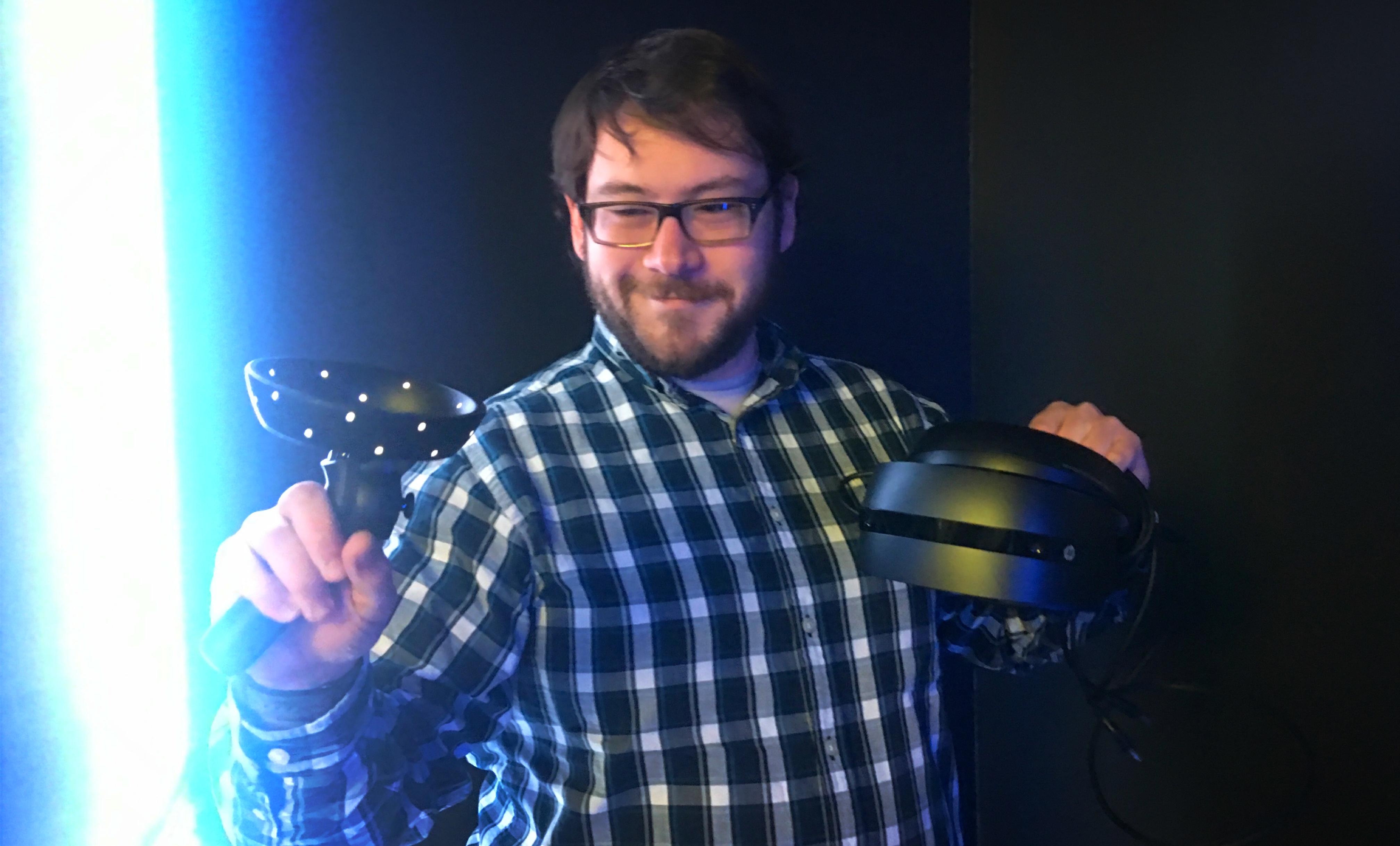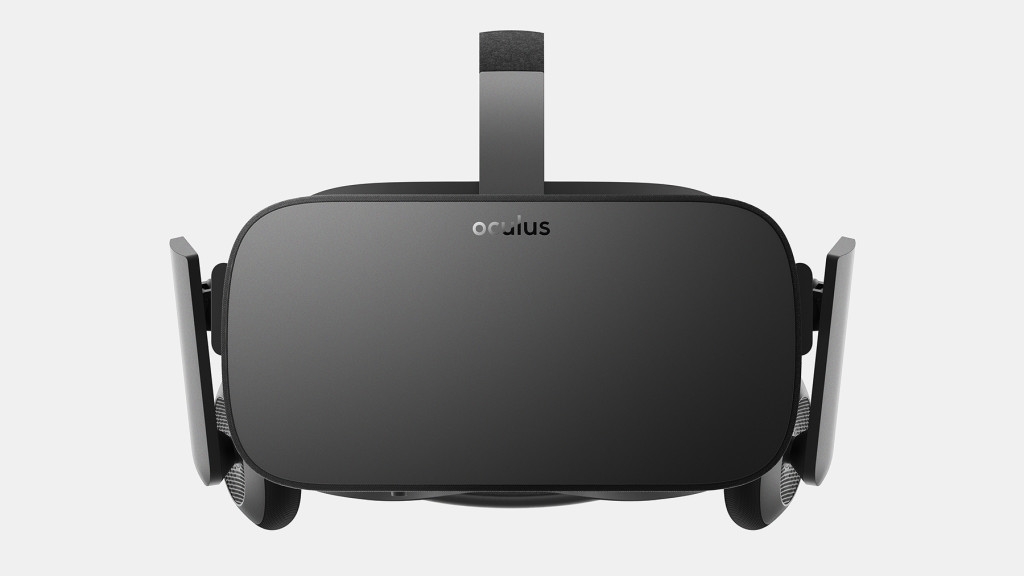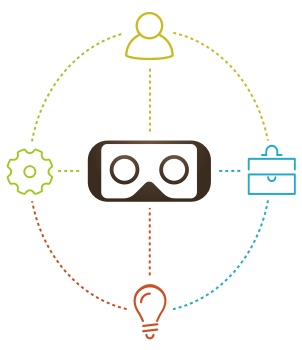
We recently had the opportunity to sit down with IVRC member, Jordan Clifford. Jordan is a young, talented developer based in Boise, ID. We have thoroughly enjoyed seeing him at our events, and checking in on his continuously improving skill sets. Here's what Jordan had to say:
Jim Bradbury: All right. Jim Bradbury with Jordan Clifford. Thanks for coming in.
Jordan Clifford: Yeah. It's a pleasure.
Jim Bradbury: Obviously. If you don't mind, first, do you mind telling me a little bit of your background in terms of your education and then anything that pointed you in the direction of AR and VR?
Jordan Clifford: Yeah. Well, that's a complicated story. I've been in school a lot for quite a few different things and I never found the thing that clicked with me. It was a long, explorative journey that wasn't fruitful, and I happened to have a friend, Caleb and we've known each other for 15 years and he saw me having this very big struggle finding the thing that's right for me, and he decided to point me in a direction. And Nick Crabbs, actually did the same thing as well, so it was kind of a ... these roads got set up for me. These paths just happened to get set up at the same time and then Caleb...invited me to start doing some development work for him.
And I didn't know how to code. When I started in March of 2016, I had taken two programming classes in my life. I had done some networking, some CCNA stuff in high school, but that's it. So over the course of four months, I went from not knowing how to program to being able to do these AR experiences and iterate on them and really bring to life the visions that Caleb was asking me to give it a shot at.
So that was really how I got started in this entire crazy world of AR.
Jim Bradbury: So you would say that you have a strong mentoring influence?
Jordan Clifford: Yeah. Yeah, and I had a couple of them. When the universe sends you two people that say, "You should seriously look at doing this kind of stuff," then you start thinking, "Maybe that's something that I should seriously consider." And it turned out to be the most enjoyable work I've ever done.
Jim Bradbury: So what about AR or VR, or both, excites you?
Jordan Clifford: Right now, we're learning to crawl, effectively, with this stuff. In the next 15 to 20 years ... honestly, I'm not sure where it's going to be and where it's going to go. 10 years ago ... I think it was 10 years ago ... Apple introduced the iPhone. And that kind of flipped the industry on its head, and the progression from there has been exponential. If you look at the hardware that we have in our pockets now, compared to what we had in 2000, there's no comparison.
So if you extrapolate that out, we're going to be in a really cool place in 15 to 20 years, and getting in on the ground floor, learning how the best way to help the computer understand “space”, it's a really cool thing to be researching and looking into and trying to implement in these early years.
Jim Bradbury: So do you think that ... when you talk about “space”, you're talking about space recognition, the ability of the computer to recognize obstacles in interactions and pull other things into that environment or pull that environment into other things.
Jordan Clifford: I think that there's this thing that's going to happen in the next few years where you see a combination of machine learning with computer vision stuff really hitting a stride and being used in most AR applications. So you'll have this understanding of the “space” that we don't currently get with most of our experiences. So not only will the phone understand that hey, that's a table, it will understand that the table is approximately “here” in the room, and it will be able to tell where it is in the room and what room it's in, all this stuff. It's just a really cool future.
Jim Bradbury: So you've said the term "cool future" twice, right? What is Jordan's version of cool? Is there some tech fantasy that's in your head where you feel like, "I can't wait until I can do," and then X, Y, or Z?
Jordan Clifford: Honestly, I'm just more excited about where other people are going to take it. I'm not in the place to expect that kind of hardware. I just know that the technology is going to be available to make those cool futuristic hardware pieces that are going to become parts of our everyday lives, like glasses with displays built into the lenses that adjust focus based on gaze tracking and whatever. That stuff is near. It's not as far away as people are thinking. You have this sci-fi view of a HUD in video games or whatever. That's not far. In the scheme of things, that's seconds away.
Jim Bradbury: Is that part of what you look forward to, is just that reveal? Kind of like with smartphones, it was like you got to a point where it was like, "Well, I don't know what LG or Samsung is going to come out with next, or Motorola," and then the smartphones blow up with the iPhone and there was very much this progression of, "Well, shoot, how good can we make this technology"? Is that somewhat similar, that type of ramp up?
Jordan Clifford: Yeah.
Jim Bradbury: Similar to what you would see where we're at with AR and VR?
Jordan Clifford: Yeah. That's my hope. It feels like we might be a little bit stalled right now, but I think that that's because I'm now on the inside and it feels like progress is painfully slow. But looking at AR from an external perspective, it's moving so fast.
Jim Bradbury: So for you, from your in the industry perspective, describe what feels painfully slow right now.
Jordan Clifford: You want everything right now. I want a phone that understands 3D space and can augment digital creatures and digital models on top of a table, because it understands the table. I want that sort of level of interaction. And it's starting to get there. It was in its infancy when I was getting going, and it's getting better now. But you still have issues with quick movements with the phone, all that kind of stuff. And we don't really have a good AR head set yet. Nobody wants to look through a screen. Nobody wants to sit there with their phone on their face, even though that's how we do AR right now. Nobody wants that. So we need to make sure that we keep moving past that.
Jim Bradbury: So looking forward three to five years from now, what are the companies that you're going to be keeping an eye on?
Jordan Clifford: I really hope Magic Leap pulls it off. I don't know what they're doing and it's frustrating to me, because I know that their technology is probably very good. But I also know that they're probably having trouble with miniaturization and stuff right now. But that's one of the main ones. The other one's Apple, obviously, with their rumored AR glasses stuff.
Jim Bradbury: 2020. (rumored Apple AR Glasses release date)
Jordan Clifford: Yeah. Right. And Microsoft. I know they cut production heavily on the HoloLens 1, if not completely. I'm really looking forward to a version 2 with ... that basically was the holy grail for AR stuff, minus the screen resolution, minus the limited battery and limited FOV.
Jim Bradbury: Kind of like the holy grail minus the immortality.
Jordan Clifford: Well, yeah. Holy grail lite. But that was basically a concept for what I want in a device in the future. Maybe not in that form factor exactly, but that's the kind of stuff that I want. And if we don't have to use the same type of light sensors or if we can rely more on computer vision and machine learning technologies instead of having to shoot IR out, that, I think in the long run, is a better way for us to go, because IR is always going to cost power, like a lot of power, to project your dots onto a surface and measure the time of flight back. But machine learning costs a lot of processing right now. But once we get something that really works, we can refine those processors so that they're only optimized for one thing. That makes them more power efficient, and then we can have a lower cost, lower power solution for AR to understand the space.
Jim Bradbury: So tell me about one of the projects that you've been happiest about.
Jordan Clifford: Positionally accurate multiplayer augmented reality experiences. Those are really fun for me to do, because it's this ... AR is tough, because you have ... you're in a personal interaction with your glasses. Nobody else sees what you're seeing. But then when we started looking at, "Hey, maybe we can do a shared experience with AR, where people are actually interacting with the AR scene via controllers or whatever," and that movement gets translated to all of the users of this system. So everybody can see the same thing at the same time. And then they get to interact. In our case, it was an AR-based shooter, multiplayer game. But the underlying idea of that consistent experience and ... what's the word?
Jim Bradbury: Contiguous?
Jordan Clifford: Yes. That experience that's shared between all of these users at the same time, I think that's really powerful. That's the other thing that really excites me about AR and VR, is education. If I would have had this stuff when I was in school, in high school and junior high, I would have had a much better time understanding the concepts that they were trying to get across. I'm a visual learner. I don't understand stuff as well just by reading. I understand stuff more when I can see what's happening. I can understand the mechanics better by looking at something than reading something, and if we had that kind of stuff in the classrooms, I think that that would be incredibly powerful.
Jim Bradbury: And does interacting with it while seeing it, is that a plus modifier?
Jordan Clifford: I mean, I would say that it's almost like a necessity at some point, but right now it can be an option. I guess it's something that I really think we need, but it's not crucial at this moment. But I think that that shared experience is so valuable that we should really think about making that a core aspect of the platform in AR and VR, is that shared experience.
Jim Bradbury: So put yourself back to when you were just beginning to learn about this stuff and teach yourself some of it, and speak to that same person today. What advice would you have for them?
Jordan Clifford: Stop worrying so much about best practices. You're going to mess up anyways. You're going to learn more by messing up in the ways that you do because you don't know best practices. That's going to be more valuable than knowing best practices and going in and being able to code something out right. Those mistakes are more valuable than the education. Those mistakes are what let me understand the system better.
That might just be something in my brain that's different, but those mistakes are actually what led to our biggest changes in our platform. That's what led to multiplayer. That's what led to starting to experiment with room scale VR on the phone. Those mistakes were fantastic.
Jim Bradbury: Sometimes mistakes open a door that you didn't realize there was something behind it.
Jordan Clifford: Yeah.
Jim Bradbury: Well, awesome. Thank you.
Jordan Clifford: Thank you.



Recent Comments